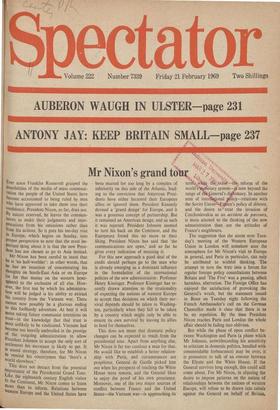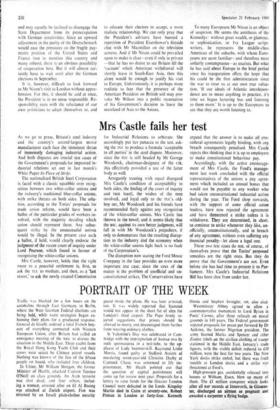Ever since Franklin Roosevelt grasped the Possibilities of the media
of mass communi- cation the people of the United States have become accustomed to being ruled by men who have appeared to take them into their confidence. President Nixon, so far, does not. RY nature reserved, he leaves the commen- tators to make their judgments and inter- pretations from his omissions rather than from his actions, So it puts his ten-day visit to Europe, which begins on Sunday, into Proper perspective to note that the most im- Portant thing about it is that the new Presi- dent has not chosen to go to Asia instead. Mr Nixon has been careful to insist that be is `no half-wonder': in other words, that he has no intention of concentrating his thoughts on South-East Asia or on Europe (or for that matter on the western hemi- sphere) to the exclusion of all else. How- ever, the first test by which his administra- tion will be judged is his ability to extract his country from the Vietnam war. There cannot now possibly be a glorious ending to this foolhardy adventure. At best it will mean taking future communist intentions on trust—in the knowledge that that trust is most unlikely to be vindicated. Vietnam had become too heavily embroiled in the prestige of the outgoing administration to allow President Johnson to accept the only sort of settlement his successor is likely to get. It 18 sound strategy, therefore, for Mr Nixon to remind his countrymen that 'there's a world elsewhere.' been marred for too long by a complex of inferiority on this side of the Atlantic, lead- ing to the conviction that American Presi- dents have either hectored their European allies or ignored them. President Kennedy devised a 'grand design' for Europe, and it was a generous concept of partnership. But it remained an American design, and as such it was rejected. President Johnson seemed to turn his back on the Continent, and the Europeans found this no more to their liking. President Nixon has said that 'the communications are open,' and so far he gives every indication of meaning it.
For this new approach a good deal of the credit should perhaps go to the man who is already emerging as a dominant influence in the formulation of the international policies of the new administration: Professor Henry Kissinger. Professor Kissinger has re- cently drawn attention to the irrationality of expecting the nations of western Europe to accept that decisions on which their sur- vival depends should be taken in Washing- ton, particularly when they fall to be taken by a country which might only be able to ensure its own survival by leaving its allies to fend for themselves.
This does not mean that dramatic policy changes can be expected to result from the presidential tour. Apart from anything else, Mr Nixon is far too cautious a man for that. He would like to establish a better relation- ship with Paris, and circumstances are propitious. General de Gaulle picked him out when his prospects of reaching the White House were remote, and the General likes to enjoy the proof of his own prescience. Moreover, one of the two major sources of conflict between France and the United States—the Vietnam war—is approaching its world's etary system-1113 now beyond the range of t .peneral's cl. omacy. In another area of interft*Vonal the Soviet Union icy—relations with ce's policy of détente. and the desire to* treat the invasion of Czechoslovakia as an accident de parcaurs, is more attuned to the thinking of the new administration than are the attitudes of France's neighbours.
The suggestion that the storm over Tues- day's meeting of the Western European Union in London will somehow sour the atmosphere for Mr Nixon's visit to Europe in general, and Paris in particular, can only be attributed to wishful thinking. The attempt to turn the WEU into a forum for regular foreign policy consultations between Britain and 'The Five' was a passing, albeit harmless. aberration. The Foreign Office has enjoyed the satisfaction of provoking the General's wrath, but the statement issued in Bonn on Tuesday night following the French Ambassador's call on the German Chancellor made it clear that there is to be no repetition. By the time President Nixon reaches Paris and London the whole affair should be fading into oblivion. and may equally be inclined to disengage the State Department from its preoccupation with German sensitivities. Since an upward adjustment in the parity of the Deutschemark would ease the pressures on the fragile pay- ments position of the United States and France (not to mention this country and many others), there is an obvious possibility of cooperation here. But it will almost cer- tainly have to wait until after the German elections in September.
It is, however, difficult to look forward to Mr Nixon's visit to London without appre- hension. For this, it should be said at once, the President is in no sense responsible. Re- sponsibility rests with the reluctance of our own politicians to adapt themselves to, and to educate their electors to accept, a more realistic relationship. We can only pray that the President's advisers have banned a repetition of President Eisenhower's fireside chat with Mr Macmillan on the television screens. And if Mr Nixon could be prevailed upon to make it clear—even if only in private —that he has no desire to see Britain fill the 'vacuum' which American withdrawal will shortly leave in South-East Asia, then this alone would be enough to justify his visit to Europe. Unfortunately, it is perhaps more realistic to fear that the presence of the American President on British soil may pro- voke Mr Wilson into a public recantation of his Government's decision to leave the mainland of Asia to the Asians. To many Europeans Mr Nixon is an object of suspicion. He seems the antithesis of the Kennedys: without great wealth, or glamour, or sophistication, or Ivy League script- writers, he represents the middle-class American of the suburbs, with whom Euro- peans are most familiar—and therefore most unfairly contemptuous—as tourists. But what he has said about Europe in the brief period since his inauguration offers the hope that his could be the first administration since the war to treat us at our own true valua- tion. 'If our ideals of Atlantic interdepen- dence are to mean anything in practice, it's time we began lecturing less and listening to them more.' It is up to the Europeans to see that they are worth listening to.



































